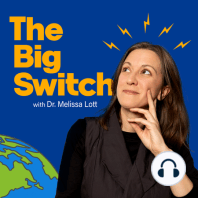30 min listen
1-800-DECARBONIZE-MY-BUILDING
FromThe Big Switch
ratings:
Length:
26 minutes
Released:
Jul 14, 2022
Format:
Podcast episode
Description
There are 5.5 million commercial buildings in the U.S. Why are only 700 of them net-zero? We have the technology to slash carbon emissions from commercial buildings, which account for 16% of all U.S. emissions. And retrofitting commercial buildings saves money and energy for building owners. So what gives? In this episode, Melissa talks to Dr. Paul Mathew, who studies buildings as a staff scientist at Lawrence Berkeley National Laboratory. He explains the reasons for this “yawning adoption gap” and offers potential solutions. They dig in on: Simplifying the retrofitting process through new solutions like one-stop shops and energy-as-a-service providers Finding creative ways to pay for the upfront costs, like green banks and energy service companies The governments that are testing out new policies like building performance standards. Also featured in this episode is EcoWorks, a Detroit non-profit that supports energy security, sustainability and retrofits in southeast Michigan. The Big Switch is produced by Columbia University's Center on Global Energy Policy in partnership with Post Script Media. This episode was produced by Alexandria Herr and Daniel Woldorff. Theme music and mixing by Sean Marquand. Story editing by Anne Bailey. A special thanks to Natalie Volk, Kirsten Smith and Kyu Lee. Our executive editor is Stephen Lacey.
Released:
Jul 14, 2022
Format:
Podcast episode
Titles in the series (46)
The High-Wire Act of the Distributed Grid: How do you balance the grid as it becomes more diverse, digital, and complex? by The Big Switch
